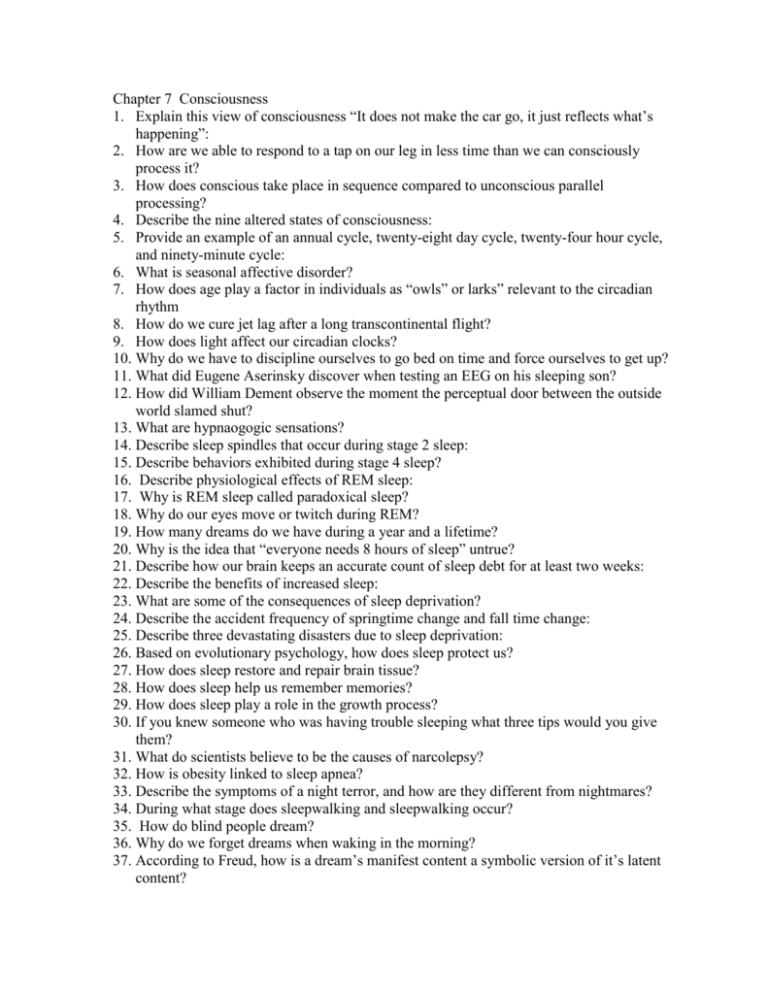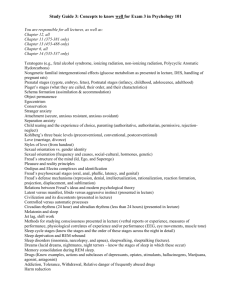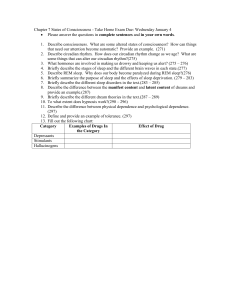Chapter 7 Consciousness questions for Myers
advertisement

Chapter 7 Consciousness 1. Explain this view of consciousness “It does not make the car go, it just reflects what’s happening”: 2. How are we able to respond to a tap on our leg in less time than we can consciously process it? 3. How does conscious take place in sequence compared to unconscious parallel processing? 4. Describe the nine altered states of consciousness: 5. Provide an example of an annual cycle, twenty-eight day cycle, twenty-four hour cycle, and ninety-minute cycle: 6. What is seasonal affective disorder? 7. How does age play a factor in individuals as “owls” or larks” relevant to the circadian rhythm 8. How do we cure jet lag after a long transcontinental flight? 9. How does light affect our circadian clocks? 10. Why do we have to discipline ourselves to go bed on time and force ourselves to get up? 11. What did Eugene Aserinsky discover when testing an EEG on his sleeping son? 12. How did William Dement observe the moment the perceptual door between the outside world slamed shut? 13. What are hypnaogogic sensations? 14. Describe sleep spindles that occur during stage 2 sleep: 15. Describe behaviors exhibited during stage 4 sleep? 16. Describe physiological effects of REM sleep: 17. Why is REM sleep called paradoxical sleep? 18. Why do our eyes move or twitch during REM? 19. How many dreams do we have during a year and a lifetime? 20. Why is the idea that “everyone needs 8 hours of sleep” untrue? 21. Describe how our brain keeps an accurate count of sleep debt for at least two weeks: 22. Describe the benefits of increased sleep: 23. What are some of the consequences of sleep deprivation? 24. Describe the accident frequency of springtime change and fall time change: 25. Describe three devastating disasters due to sleep deprivation: 26. Based on evolutionary psychology, how does sleep protect us? 27. How does sleep restore and repair brain tissue? 28. How does sleep help us remember memories? 29. How does sleep play a role in the growth process? 30. If you knew someone who was having trouble sleeping what three tips would you give them? 31. What do scientists believe to be the causes of narcolepsy? 32. How is obesity linked to sleep apnea? 33. Describe the symptoms of a night terror, and how are they different from nightmares? 34. During what stage does sleepwalking and sleepwalking occur? 35. How do blind people dream? 36. Why do we forget dreams when waking in the morning? 37. According to Freud, how is a dream’s manifest content a symbolic version of it’s latent content? 38. Why do some researchers denounce Freud’s wish fulfillment of dreams? 39. How are dreams like information processing? 40. How does REM sleep help our memory? 41. Describe the activation-synthesis theory: 42. Describe the limbic system’s role in dreaming: 43. Describe how cognitive researchers view our dreams as part of brain maturation and cognitive development: 44. What is the relationship between biological and psychological explanations of dreaming? 45. Describe hypnotic “susceptibility”: 46. Describe age-regression: 47. How do “hypnotically refreshed memories” combine fact with fiction? 48. Does hypnotism help with pain relief? If so how? 49. What do PET scans reveal about hypnosis and pain stimuli? 50. How do people begin to feel and behave in ways appropriate the role of the “good hypnotic subject”? 51. What do researchers mean when they refer to a “hypnotic state”? 52. Describe Khilstorn's and McConkey’s “unified account of hypnosis”:




